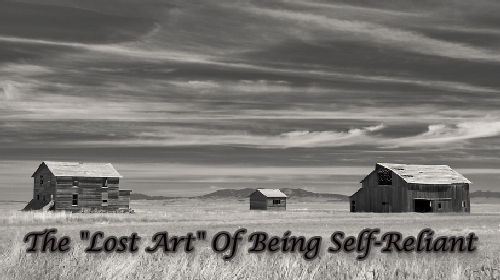When getting started in homesteading, money can be real tight, even sometimes for the basics. Here is a great course that can help you learn the “lost art” of being self-reliant.
What is the first thing that comes to mind when you think about homesteading? Do you think about canning tomatoes with your grandmother?

Maybe you envision a pioneer woman churning butter or knitting socks. Often times, sustainable living comes to mind. Sustainable living is not just for rural people: Even with limited or no space, you can take steps to become more self-reliant!
In light of turbulent economic times, many Americans are turning to the lost art of self-sufficiency. Pressing times are upon us, and the evidence is everywhere in the form of home foreclosures, brown sack lunches and sacrificed vacations. My goal for the new year is to do away with the grocery store as much as possible. I went to my pantry and figured out everything I could raise instead of buying. My advise to you is to start small and learn how to do something new every week. Knowledge can never be taken away from you! I made a list of skills that should be developed to be a successful homesteader .
The Old Way Of Homesteading :Learn The ” Lost Art ” Of Being Self-Reliant
- Learn how to grow a vegetable garden and the art of no-till gardening in your climate and how to properly prune and graft a fruit tree. Grow a windowsill herb garden.Taking cuttings and rooting them. This is an easy way to propagate, once you get the hang of it It’s an indispensable skill when you get a good plant that would not seed true-to-type.
- Build/use a greenhouse or cold frame to extend your growing season and how to start seeds indoors.Learn how to save and store seeds for the next planting seasons.
- Know how to dehydrate foods to preserve for later use.
- Learn how to raise livestock the right way.
- Learn how to milk a cow, sheep or goat and how to make your own cheese – master simple soft cheeses and hard cheeses too, butter, yogurt, etc.
- Know how to assist with foaling or calving an animal with a difficult birth or give an animal an injection (in the muscle, in the vein, or under the skin).Learn how to clean, dress, and stitch/staple a wound. Could come in handy for both people and livestock. Know how to tell if you can doctor an animal at home, or if it needs to be taken to the vet.
- Learn to tag, load, and take animals( goats) to the sale barn or to market by yourself.
- Learn how to humanely kill, gut, and clean an animal, how to butcher an animal and the proper cuts of meat.
- Learn how to build and properly use a smoke-house to smoke cheeses, meat, bacon, hams, game and make your own bacon, cured hams and how to render lard or tallow for long term storage. Learn how to use lacto-fermentation to preserve foods. Learn how to use a pressure canner and/or cooker and use a water bath canner to preserve foods. Store food in a root cellar or in a cool basement.
- Learn to make your own bread, grind your own wheat for baking and gather wild yeast” to make your own yeast for breads, etc. This is quite easy to do in many parts of the US (although not so much in the desert.). Make basic yeast dough which can be turned into loaves, rolls, buns, pretzels, etc. Make sourdough bread and maintain your own starter.
- Know how to build a fire and how to cook over an open fire or on a wood cook stove. Cook outside with a dutch oven. Heat your home with wood or other sustainable sources and learn how to harvest, split, and stack firewood.
- Learn how to hunt wild game–both large and small and learn how to properly handle, shoot, and clean a gun.Learn the laws and regulations regarding hunting wild game in your area through a Hunter’s Safety course.
- Know how to drive a manual transmission and/or tractor. Master basic mechanic skills so you can fix your tractors and vehicles. Change a tire and change oil.
- Home brewing. This year I learned to make mead. It’s been a fun adventure and a wonderful way to use resources such as fruit and honey when you’ve canned and jarred just about all the jam and jelly you can stand. Plus, it makes for great gifts about the holidays and if you ever enjoy a tipple yourself, is incredibly cost effective.
- Learning to make your own toilet paper or paper for that matter can be easy. Here are some items that you can use: old jeans, hemp, bamboo, old news papers, etc. You cut them into small pieces and then put them in a processor. (We did this in school with old jeans to make paper). Put the blend in water and remove large pieces. Then using a screen, apply the mixture on top of the screen til you get the thickness you desire. (This takes practice but if you mess up, you can always put the paper back in the mix and reuse). You can always experiment with other materials. (My wife likes to add petals, small flowers or herbs to hers and make cards). There’s no limit to its uses. My family has decided to use old jeans cut into small wash clothe sizes to use as toilet paper. We wet them for extra cleaning when needed. To dispose, we use a small waste can and launder them daily so there’s no smell. To clean the waste can, I like to use orange peel and clove cleaner. You can also use a 5 gallon bucket of vinegar water to soak reusable toilet paper. Then there is no smell, and you do not have to launder them as often!
- Learn how to darn a sock. Mend damaged clothes so they don’t have to be thrown away.Sew clothing and fabric items from scratch. Knit, quilt, or crochet and how to weave.
- Learn to make your own compost. Compost both kitchen scraps and animal manure. Put food scraps like eggshells, coffee grounds, apple peels, and whey to good use. Learn about vermiculture. Worms are great for composting, fishing, and treats for the chickens.
- Learn about aquaponic gardening. It’s a great way to grow plants and fish at the same time. The aquaponic system it’s almost self-sufficient. All of my gardening is done in containers. I also utilize vertical gardening. You can grow quite a bit in a small area.
- Learn how to fish, how to clean, fillet, and cook it and learn how to make your own fishing lures. A 1″ stick sharpened on both ends with a slight groove in the middle to hold the line in place makes a great hook. Here we can add drying and smoking fish for long term storage.
- Learn how to tell if your chickens are molting and how to candle eggs so you can tell if they are fertilized then incubate fertilized eggs and hatch your own chicks. Learn how to identify and manage a broody hen, how to kill and pluck a chicken and how to cook a whole chicken.
- Master basic carpentry skills so you can repair outbuildings or even build basic furniture pieces indoor constructions ,framing dry walls. Learn how to build and fix a fence or how to repair your roof.
- Learn to make your own soap candles, laundry detergent and and how to dry your laundry using a drying rack or clothesline.
- Learn basic metal working skills and welding, basic plumbing skills (like unclogging a toilet!) and how to install/use a composting toilet.
- Animal training. Dogs are invaluable farm helpers and goats make great pack animals for hauling things about the farm on a cart to save your back from pushing a wheelbarrow. If you’re good at it, dog and horse training can make a great side-income!
- Learn how to make your own ammo. Recent shortages have shown this could be a lifesaver.
- Learn how to tie various knots and how to make and use various traps.
- Animal husbandry: I would recommend that if you have horses or mules or whatever, that you learn to hitch them to be able to plow or pull. You may have yourself or a neighbor stuck in the mud when a team could hitch to the vehicle and pull it out. Also, how to pack gear on an animal (horse, donkey, dog, goat) for certain excursions. I also suggest perhaps getting a buckboard style wagon if you have the room. Why use gasoline or diesel when you could hitch up a horse or mule to your wagon and haul items around the homestead, work on fence, move items,bee keeping skills?
- One lesson I’ve learned is how to maintain a well. When I bought my place, I was fortunate enough to have all water supplied by my well, that was great and all until I needed to figure out how to keep it safe and pleasant to use. So learn the components, how to maintain them and how to take care of water issues. And as a final tip learn how to thaw out a water fountain with the wind chill at -35 degrees.
- Learning homeschooling techniques is an excellent idea! For those who don’t know where to start, I would say that teaching a child to read is the first skill to learn. For anyone who might be teaching reading skills to a young child, learn Phonemic Awareness and Phonics instruction.
The majority of skills on the list can be accomplished by those with small suburban lots, proving that EVERYONE can homestead! . It’s sad really to think that just a couple generations ago, most people knew all of these skills and more. Now most skills are lost. Everyone needs to learn them all over again. I recommend “The Lost Ways” book. It has excellent information that will help many in their journey to becoming more self sufficient as we need so much of this basic knowledge of our ancestors that has been lost nowadays.
If you found this article useful, please like our Facebook page and stay up to date with the latest articles.
CHECK OUT OUR survival and prepping solutions.
Read also:
A RETURN TO THE OLD PATHS: HOW TO MAKE PEMMICAN LIKE THE NATIVE AMERICANS
SEVEN CLASSIC GREAT DEPRESSION ERA RECIPES GRANDMA USED TO MAKE
20 LOST RECIPES FROM THE PIONEERS: WHAT THEY COOKED IN THEIR JOURNEY WESTWARD
POTTED MEAT: A LOST SKILL OF LONG TERM MEAT STORAGE
BACK TO BASICS: HOW TO MAKE AND PRESERVE LARD
THE BEST WAY TO STOCKPILE VEGETABLES OFF-GRID
OLD FASHIONED PRESERVING-GRANDPA’S RECIPE FOR CURED SMOKED HAM



